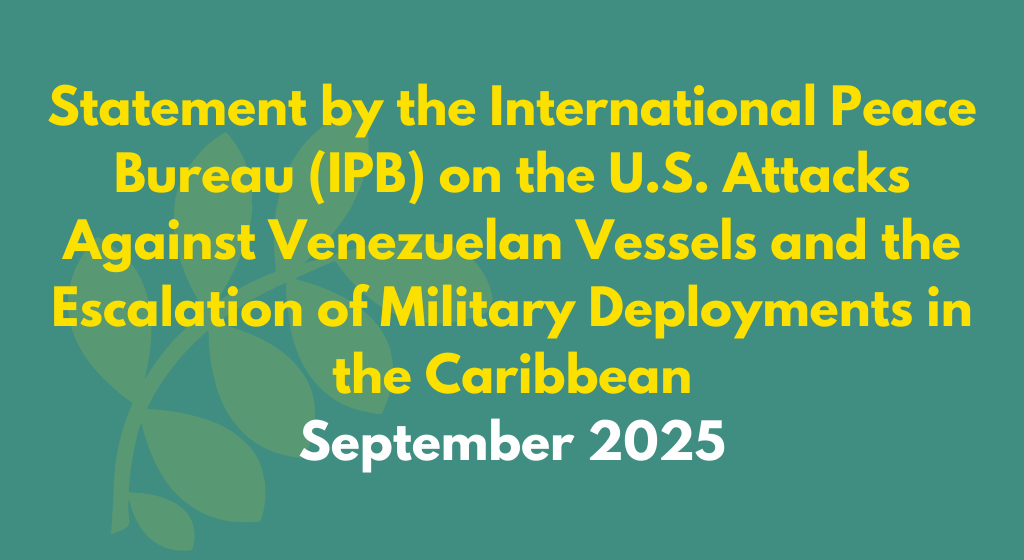The International Peace Bureau (IPB) expresses deep concern over the recent deployment of U.S. Navy destroyers off the coast of Venezuela and, most urgently, the destruction of two Venezuelan vessels that resulted in the deaths of 14 people. Such militarization of the Caribbean constitutes a direct threat to the “Zone of Peace” that Latin American and Caribbean states have collectively declared. Far from promoting stability, these actions risk inflaming tensions, undermining sovereignty, and dragging the region into dangerous cycles of militarization and violence.
On 2 September 2025, the U.S. military carried out a strike against a small boat in the southern Caribbean, killing 11 people whom U.S. officials described as suspected members of the Venezuelan cartel Tren de Aragua involved in drug trafficking. Public details remain sparse: U.S. officials have not released evidence of the cargo, quantity of drugs or the precise legal basis for using lethal force at sea instead of seizing the vessel. Two weeks later, the US military has killed 3 more people in another deadly strike on a vessel in international waters allegedly “transporting illegal narcotics” from Venezuela.
Simultaneously, the United States has announced the increased presence of naval destroyers, Marines, and advanced fighter aircraft in the wider Caribbean basin, signaling a pattern of military escalation far beyond the single incident.
Venezuela is not a significant producer of narcotics. Coca cultivation is concentrated in Colombia, Peru, and Bolivia, while Venezuela’s role has historically been that of a transit corridor. Moreover, the overwhelming majority of cocaine flows toward the United States move through the Pacific and Central America, not the Caribbean. The Caribbean has historically accounted for a small fraction of around 5% of trafficking routes. Deploying destroyers and carrying out lethal strikes in Caribbean waters is therefore disproportionate to the scale of the issue.
Implications for peace and security
The strikes and the wider U.S. military escalation in the Caribbean have profound consequences. First, they undermine regional commitments to peaceful coexistence. In 2014, the Community of Latin American and Caribbean States (CELAC) collectively declared the region a “Zone of Peace”, committing to resolve disputes through dialogue and cooperation rather than force. The use of lethal military action in international waters stands in direct contradiction to that commitment.
Second, Latin America and the Caribbean remain the world’s first nuclear-weapon-free zone under the Treaty of Tlatelolco. This landmark treaty is a cornerstone of regional security, expressing a collective choice to build security without weapons of mass destruction. Yet, by expanding its military footprint and normalizing combat operations in the region, the United States erodes the very principles of demilitarization and restraint on which regional peace has been built.
Third, such actions risk triggering wider escalation. Military deployments and unilateral strikes create mistrust, fuel polarization, and invite reciprocal measures. Rather than reducing crime, militarization of counter-narcotics policies risks drawing the entire hemisphere into new cycles of conflict.
Fourth, the strike reflects a weakening of international law and institutions. By bypassing transparent legal processes and operating outside multilateral frameworks, the United States undermines the authority of international bodies that exist to mediate disputes and uphold norms. This erosion of collective security mechanisms sets a dangerous precedent where powerful states act unilaterally, weakening the very fabric of international law.
Finally, these operations contribute to the increasing militarization of every sphere of international relations. From migration to organized crime, from border management to disaster response, military tools are being prioritized over civilian, cooperative, and developmental approaches. As the IPB has long emphasized, real security is common security: it is built on cooperation, human rights, sustainable development, and the dismantling of structural violence. Militarization does not solve these problems, it only deepens them.
The International Peace Bureau urgently calls for:
- An immediate halt to unilateral U.S. military operations against vessels, the escalation of military activity in the Caribbean and against targets in Venezuela, and the withdrawal of U.S. Navy destroyers from the region.
- Full transparency by the U.S. government regarding the strikes, Including any evidence or the lack thereof.
- Respect for international maritime law and a return to cooperative law-enforcement approaches that respect due processes.
- A reorientation of policy away from militarization and towards reducing drug demand through public-health approaches to drug use.
- A reaffirmation of Latin America as a Zone of Peace by pressing for de-escalation and peaceful resolution mechanisms.
- Supporting regional cooperation based on non-military responses.
The rush to militarize counter-drug policy risks exacerbating geopolitical and domestic conflicts. IPB stands for peace, transparency and common security: security that protects people’s lives and livelihoods through cooperation, development and justice, not through unchecked use of force.
We call on governments and civil society alike to reject escalation, to demand accountability and to recommit to an architecture of peace and cooperation.

